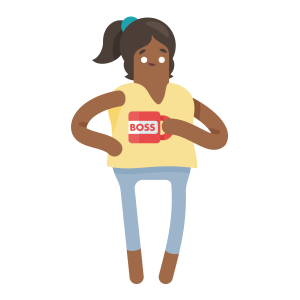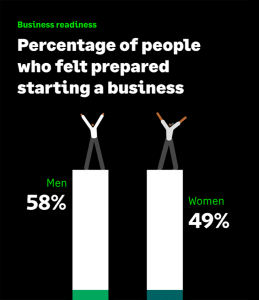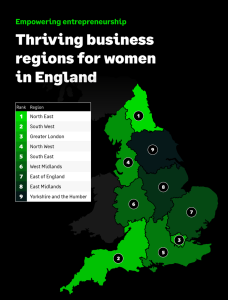Which are the top regions in England for female entrepreneurs?
An expert in HR research explains the findings of a recent study into the top regions in England for female entrepreneurs. It looks at some of the key challenges for startups, and how prepared and supported the entrepreneurs feel when starting their business.

1 in 3 female entrepreneurs experienced a lack of support during their startup journey, a recent study has revealed. This report focuses on the dynamic landscape of women-led startups, shedding light on what awaits future graduates in the world of entrepreneurship.
Offering compelling insights for students eyeing entrepreneurial ventures post-graduation, the study by Sage takes a deep dive into the areas where aspiring entrepreneurs, particularly women, have found their footing, the hurdles they’ve encountered, and the support structures that have been instrumental in nurturing their startup aspirations.
Business readiness
Especially relevant for aspiring student entrepreneurs is the discovery that many male and female business owners, despite possessing skills and knowledge, still grappled with feelings of unpreparedness when launching their startups. Approximately 27% of women and 23% of men candidly admitted to not feeling entirely ready for the challenges that loomed ahead.

Image source: Sage
Perhaps most striking is the unanimous recognition among 97% of all entrepreneurs that ongoing skill development and enhancement are vital for effectively steering their businesses. This insight carries valuable implications for students planning to embark on their entrepreneurial journey after graduation.
Regional breakdown
The North East was revealed as the top region for women-led startups, with 81% of female entrepreneurs in this region reporting feeling supported as they embarked on their business ventures, and 69% of them highlighting their ability to manage the delicate balance between work and life commitments. Sage’s index considered factors such as the female employment rate, the gender pay gap, the cost of office space, as well as data from the study. This detailed how many women in each region felt they were sufficiently supported, and how well they had been able to manage their work-life balance.

Image source: Sage
The study also found that 51% of women were more inclined to start their own business to seek out more flexibility and improved work-life balance, while the top reason for men entering the business world was the pursuit of financial opportunities (48%).
Start-up challenges and support
The research shone a spotlight on the distinct challenges that women entrepreneurs encounter, revealing a disparity when compared to their male counterparts. Areas of struggle encompassed profitability (77%), the intricate balance between work and life (72%), the initiative of environmental sustainability (65%), the art of cost minimisation (71%), adept financial management (74%), comprehensive tax understanding (75%), and seamless technology adoption (69%).
What’s also interesting to note is that more women (12%) didn’t tap into any funding sources when they started their businesses, while it was only 6% for men. This really highlights a clear gender gap when it comes to getting the financial support and resources needed. Plus, the study revealed that women often faced a lack of support on multiple fronts, from financial aid to help from the government, local councils, trade groups, and industry networks. In fact, 32% of women felt they could’ve used more support or got no support at all, compared to 29% of men.
One area that really stood out about female entrepreneurs was their confidence in chasing future success. The survey illuminated that women exuded heightened optimism regarding various milestones to be achieved within the forthcoming year, including:
- Increasing profitability (68% vs. 67%)
- Expanding brand awareness (67% vs. 64%)
- Enhancing customer satisfaction (74% vs. 72%)
- Boosting sales (66% vs. 61%)
- Pursuing environmental sustainability (61% vs. 53%)
You can read more about the study from Sage here.
About the author:
Jessica is Director of HR Research, Insights and Thought Leadership at Sage UK
She writes content for HR and People leaders and is passionate about the changing nature of work today. She has a keen interest in macroeconomics and productivity, and she’s a keen contributor and speaker at many HR events and webinars.
Find out more:
Grad Bites: Tips from a Young Entrepreneur
For those Budding Business Brains…
Top Tips for Young Entrepreneurs Ready to Start a Business

